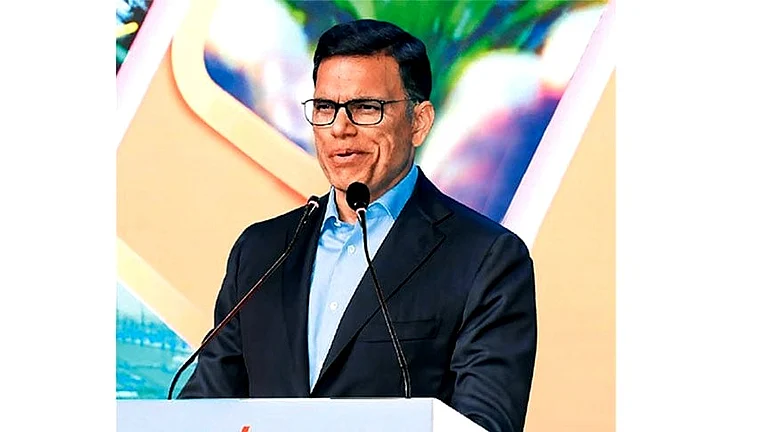You grew up in a prominent business family. From the beginning, did you know this was the path for you, or did you consider a different one?
I have fond memories of Babaji [OP Jindal, his grandfather] taking us—Abhyuday, Venkatesh [his cousins] and myself—to the factory. My dad would also take my sisters and me to the factory whenever we went to Vasind or Vijayanagar.
In Vasind, they [his parents] created a big farmhouse with everything we wanted as kids. If we wanted a squash court or anything, it was always built in the factory. That became our incentive. We were told, “Let’s go to the factory for the weekend,” and we’d be excited.
We’d say, “Let’s go to Vasind” or “Let’s go to Vijayanagar” for the weekend. In the evenings, Dad would come home from work and after dinner, he’d say, “Let’s go for a drive to the factory.”
My sisters often refused, but I would go with him. I always remember that; just sitting with him, being around him. Listening to him talk to colleagues at JSW, hearing how he planned things, those conversations were constantly happening around me. I was always observing. I even had my own small mini helmet with my name on it.
My parents were very clear: pursue whatever you want, explore whichever area interests you. But somehow, it was always kind of understood that we would be part of the business and help dad. It was never explicitly said, but it was always an unspoken expectation.
Was there ever a time you thought that life abroad might be less stressful given that here, you’d carry much more responsibility?
Actually, the only time my father put a little bit of pressure on me was when I was choosing what to study. He wanted me to study physics and math, and wanted me to become an engineer. But when I realised I didn’t enjoy it, I told him I wanted to switch to economics and political science.
That’s where my real interest was. That was the only time he got a bit upset, he was slightly disappointed. Even now, if you ask him about me, he’ll say, “I wish he were an engineer. Engineers think differently.” Which is fine. When I was in my undergrad, during my senior year—my fourth year—I was extremely restless. I was dying to get into the working world. I told my dad, “I want to come back and join the business immediately.” But he told me, “You must work outside first. You need to get some experience. Understand how the world works. You’re already in the US, learn from there.”
Then he added, “I want you to work in Japan. Only then come back. Don’t return fresh out of college.” It was a stepping stone leading up to coming back. I worked in investment banking, then at a hedge fund; purely to understand how the investment community looks at companies in India. I wanted to understand how they thought about investing in India. What kind of conversations happen in boardrooms when they’re deciding whether to invest in a JSW or a Tata—or anyone else.
That one year of working and living in New York, on the emerging markets desk, really helped me understand. Even now, that experience helps me when I’m negotiating with someone, I know what kinds of discussions they've likely had. It's as much a call on the business as it is on the promoter.
Then I went to Japan, and that was an incredible experience. I learned how steel is made in Japan. I learned everything—from just-in-time delivery to their quality control, product development and how they worked with the auto and appliance industries. It really taught me how steel is made and where we stand in comparison. Then I came back to India, before going to business school and was part of the team working on building India’s first auto-grade steel plant.
Seeing what a mature country like Japan, and companies like JFE Steel, were doing made it clear how large the gap was between them and us. Then I went for my MBA. I was always excited about coming back to India. I wanted to live and work here. I had been outside India for almost 10 years. Maybe part of it was because I was dating—my wife was my girlfriend then—but I always wanted to return and work in India.

When you returned from the US, why not JSW Steel? Why cement, paints and other new businesses?
I was 26 when I came back. I attended meetings. I felt I was only in the room because I was the owner’s son and I didn’t belong there. Why should I go into JSW Steel and tell someone who’s worked there for 25 years what to do? Even before going to business school, I had started looking after the cement business; it was losing money at the time. I felt that if I could turn around a loss-making business, it would give me a lot of confidence and credibility within the group.
While I was at Harvard, I thought about what JSW should do next. Over two years, I met people from the next generation of various established business families. That’s when I realised JSW needed to diversify. So, when I came back, I started the venture fund, thought of the idea of JSW Paints and took over cement.
My thought was: can I create my own mark? My own name, even in my own head? Forget what happens outside JSW, but even within JSW, can people look at me and say, “This guy has done something”? So now, when I walk into a room and say something, people will listen, because I’ve proven I can deliver. That was the motivation behind starting all these new things.
I think our foray into auto is going to be our next JSW Steel for the group...Energy will be a big business too.
You’ve been running these businesses for a few years now. Do you feel like you’ve earned it?
I think the first marker of success in my head is that I have to take my company public. Hopefully, JSW Cement will go public soon. That would be a big milestone for me. Taking over a loss-making company, turning it profitable, and then, eight or nine years later, taking it public.
I was recently put on the JSW Energy board. It’s the first public board I am on. So yes, I feel a lot more confident now. I feel more certain. I feelI can sit in on a steel meeting or an energy meeting.
The decision of whether I take over JSW Steel, JSW Energy, or any of our publicly listed companies. That’s not my decision to make. That’s a decision my father and the board will take.

What’s your broader vision for the group?
As a group, we’re in an amazing position. The contribution of manufacturing to GDP is only going to grow. When you look at this sector in India, there are only five or six large groups doing hardcore manufacturing at scale and JSW is one of them.
So, the opportunity for JSW is immense. Manufacturing is JSW’s core strength, and we must stay very clear and committed to it.
I think our foray into auto is going to be the next JSW Steel for the group. It marries our group’s passion for manufacturing with my passion and interest in sales and marketing.
Interestingly, for the first time in our group’s history, JSW Energy’s capex is going to be higher than JSW Steel’s. So, energy will be a big business too.
The economy today is very different from when your father’s generation built their businesses. How do you see this environment for the next-gen leaders taking over today?
Today, it is very difficult to find people who will work with you for 25–30 years. On top of that, there is so much shift in technology. Digital, AI, machine learning...it’s all evolving so rapidly.
I think the only way to move forward now is to be extremely professional. You also need to look at a business more dispassionately. Second, you can no longer just aim to be the best in India. You have to aspire to be the best in the world. You have to be aware of what’s happening globally in technology and you have to keep investing not just in people but also in your processes and systems.
JSW Steel is one of the top steel companies in the world by market cap. So India is now operating at that size and scale; your benchmark has to be your global peers.
For me, for example, today it’s almost impossible to know everything happening across the Group. Earlier, it was steel—and steel meant Vijayanagar, Vasind and Tarapur. That was it. Now, I don’t even know how many locations we have across the group.
So the only way to keep growing, to stay a leader is to have the right people and the right systems. You also need proper succession planning, otherwise there will be too much reliance. For example, today my dad is around 65. Everyone who built the group with him is around the same age, plus or minus a few years. They will all retire at some point.
Is the group ready for that? If you rely too much on certain people, then when they retire, there will be a huge vacuum. That’s something that’s always on my mind. We constantly plan for it: who’s next for this role, who’s next for that role? Do we have enough talent internally? Do we need to bring someone in from outside? If we bring someone from outside, how long do they need to work in our system before they take on that role? All these things are ongoing discussions.
But I also believe—truly there is no bigger opportunity anywhere in the world than there is in India. We’re really fortunate to be here, in India.

Your family’s succession was peaceful. How does that shape your thinking about future successions?
Credit must be given to my grandfather. Just outstanding planning and thought process.
When I was at Harvard, I actually gave a talk on our family’s succession and how there is cross-holdings but there is independence. When we had problems, my uncles helped my father, and when they had problems, we stepped in. We are all together in everything.
Similarly, I feel that the three of us, my sisters and I, we are together in everything. They have their passions, and I have mine, and we are all working on the business in some capacity or the other.
And at the end of the day, we are shareholders. I think the principles that my grandfather set are the basis on which the next generation and the generation after will follow.













